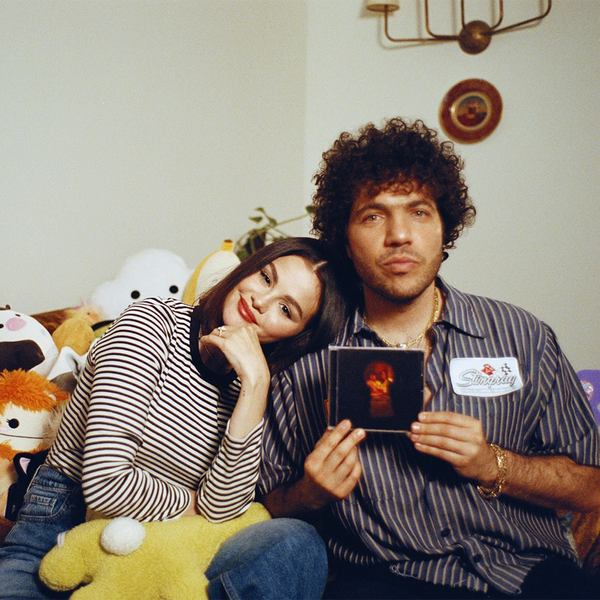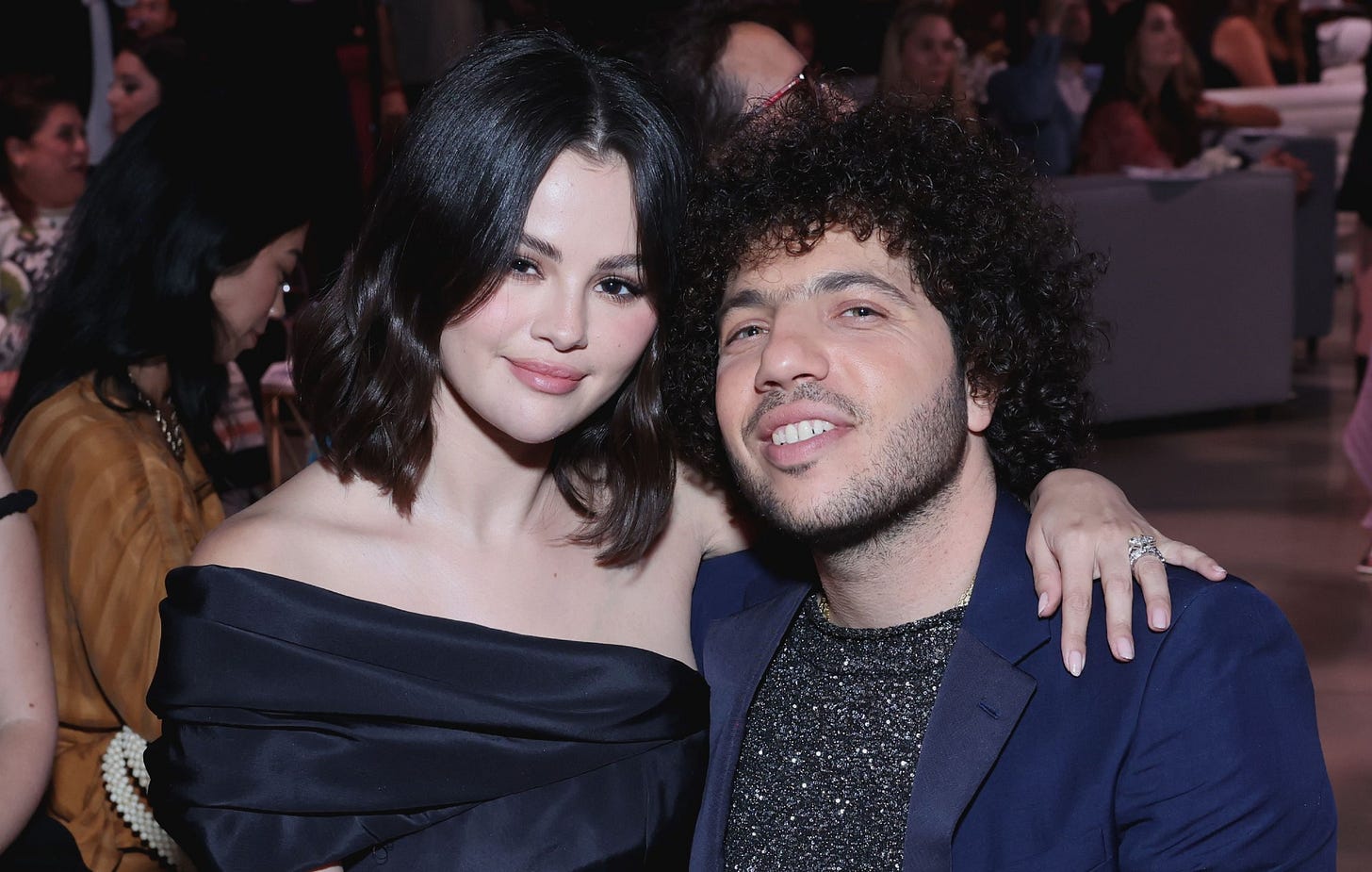Selena Gomez & benny blanco: Good For Them!
The couple’s first collaborative LP is a scattered, dull project that tells us far too much about their inner lives – whilst also somehow revealing nothing we couldn’t have guessed.
These days, music is probably the last thing the public knows Selena Gomez for. Who can blame them? It’s true that her pop stardom has taken a backseat to her other post-Disney ventures. You can catch her on Disney+ (or Hulu for Gay Pop’s US readers), Apple TV+, Max and Netflix, watch her dip in and out of her Instagram – where she is the most-followed woman – and buy her makeup, her cookware, or her old looks. It’s a shame that she’s shown an allergy to the studio as of recent; though the general reception to her rare (pun intended) music releases typically ranges from lukewarm to non-existent, Gomez has the capacity to strike gold when she hops on the mic. Her sophomore record, Revival, was one of the more consistent and engaging ‘bad girl’ pop albums of the ’10s decade, and her brief run of 2017-18 singles that included ‘Fetish’ and ‘Bad Liar’ is fondly remembered. Yet the lack of noise around her later releases – namely, her 2020 album Rare and her Spanish-language EP Revelación – coupled with her clear preference for acting, has meant that music from Selena Gomez comes about as often as a new US President.
So, when Gomez announced the release of I Said I Love You First, I’ll admit, reader, I was cautiously optimistic. For this album, she worked with her new beau benny blanco (who, unfortunately for this grammar-fixated writer, insists on that exact name stylisation) – a known hitmaker behind many a white-girl banger. If we put the obvious punching on blanco’s part aside, Gomez’s whisper-pop stylings married to blanco’s production had the recipe for success. But too many cooks, stale ingredients and a confused tasting palette (okay, I’ll stop) have led to an album that wanders both aimlessly and desperately around soundscapes, befuddling the listener almost as much as the announcement of Gomez and blanco’s relationship itself.
I Said I Love You First is too much of too little, an exercise in music for music’s sake, a hollow carcass of a product (I hesitate to call it an album) that exists for no-one except Gomez and blanco themselves. It’s like one of those cutesy couples-therapy exercises where they each write each other a shitty song about how much they love each other (with the closest resemblance to this template being the saccharine ‘Scared of Loving You’) – except here, the couple in question has a budget and proven talent on their sides, yet use none of it. It reeks of a lack of effort that might well be the death knell to Selena Gomez’s music career she seems to have been subtly chasing. But, Ms. Gomez, I’d argue that surely no music at all would be better than this.
Perhaps I’m being harsh; there are flickers of good music in here, after all. ‘Younger and Hotter Than Me’ is essentially ‘How to Disappear’ 2.0 (no bad thing!), and proves that Gomez’s most incisive writing is often about the on-again-off-again relationship for the ages – ironic for an album written in collaboration with her fiancé. The María Zardoya-featuring ‘Ojos Tristes’ is a moody heartbreak voyage that would’ve fit comfortably on Zardoya’s band’s last album. ‘Bluest Flame’ makes its Charli xcx cowrite apparent within its opening seconds, essentially a ‘pink diamond’ flow atop a ‘Talk talk’ beat done to a degree that, upon repeat listens, isn’t half as compelling as either of those tracks. (Still, it’s hard to make a bad hyperpop song.) Even ‘Don’t Wanna Cry’ is a decent dance-pop song, despite dancing in the shadow of ‘Flowers’ before it. There’s a pattern with I Said I Love You First’s best songs: they only really sound good because of who they remind you of, and borrow from the Gracie Abrams playbook of imitation without innovation.
Speaking of Abrams, her and Gomez’s ‘Call Me When You Break Up’ on this album might be its single most offensive moment purely for its sheer banality. It’s a punk-lite thimble of a song that makes no effort to be original, charming or anything resembling memorable. blanco, a writer behind some bulletproof pop hooks, should know better than to follow a one-line chorus with a one-line post-chorus. (And neither of those one-liners are even any good!) The placement of the upbeat ‘Call Me’ in the tracklist is also baffling, sandwiched between the meditative ‘Younger and Hotter Than Me’ and the mournful ‘Ojos Tristes’. It speaks to a wider problem plaguing the album: its try-everything approach to its sound not only means that it dips it toes in a range of genres without adequately submerging itself into any of them, but the sequence of tracks careens around disjointedly and altogether confusingly. Where something like Lady Gaga’s recent MAYHEM made its eclectic range of influences cohere into a singular experience, I Said I Love You First is really quite random, making it a struggle to trace the story that acts as its throughline.
About that story: the album sketches the journey of Gomez and blanco as a pair, from the wreckage of a failed relationship to the birth of a new one. Though a tried-and-true narrative, it works and can be compelling from the right pen (later this week, Ariana Grande will release the deluxe edition of an album that told this exact story with rewarding returns), but the insight we get into Gomez and blanco’s romantic bliss is excessive at best and horrifyingly TMI at worst. Single ‘Sunset Blvd’, which has a serene lo-fi instrumental, is marred by the shocking writing, which finds Gomez waxing lyrical about how she can’t wait to grip blanco’s ‘big… hard… heart!’ Don’t get me wrong, I’m thrilled that she’s getting some, but I’d really rather not hear about it.
Worse still is ‘Cowboy’, a passionless, trap-inflected sex jam whose title tells you all you need to know. As metaphors for intercourse go, the pop artists of today have found increasingly inventive ways to describe its decadence (among them a surfing trip, a cup of coffee and a serving of honey), so to limit your lyrical playfulness to just describing a named sex position is just restrictive. The GloRilla spoken-word outro – about, no kidding, her affinity to ‘put that bitch in sports mode and ride it 'til I can't no more’ – is so batshit it sounds out of place with the milquetoast fare that Gomez and blanco serve up on this record. Sometimes, being bad is better than being boring. Another spoken-word interlude, ‘Do You Wanna Be Perfect’, follows this philosophy of awfulness to a T; its trite sentiment (about how social media’s standards of perfection is unattainable – we know!) is so downright dated I sat up from my chair and played it again to make sure I heard it correctly. It’s the exemplification of ‘what the hell, sure’ in music.
A press release for I Said I Love You First claimed that it would give a ‘unique window’ into the pair’s relationship, which is only half true. ‘Unique’? See above review. This album is anything but unique, a confused Frankenstein of sonic identities that makes it hard to locate Gomez and blanco in their own (apparently album-worthy) love story. But ‘window’? That’s more like it. I Said I Love You First offers a window into Gomez and blanco’s relationship in that you can see everything going on – when maybe it would’ve been best to close the blinds sometimes – yet the couple through the glass are unreachable. You won’t find out why they love each other (incurious penmanship runs amok over this album’s lyrics, with empty platitudes like ‘love me ‘til I die’) but they’ll sure as hell try and show you. The album cover captures this dichotomy well; through a narrow and intensely filtered lens, we view Gomez and blanco mid-make out looking curiously disaffected. They are at once far away and far too close, too basic in their presentation to make a definitive statement and too intimate to warrant a listen from anyone but themselves. Next time, keep it in the iMessages.
4/10







you're become my anthony fantano and pitchfork all at once btw
This is such a glorious read